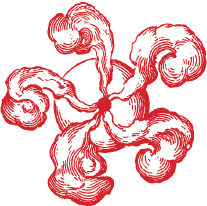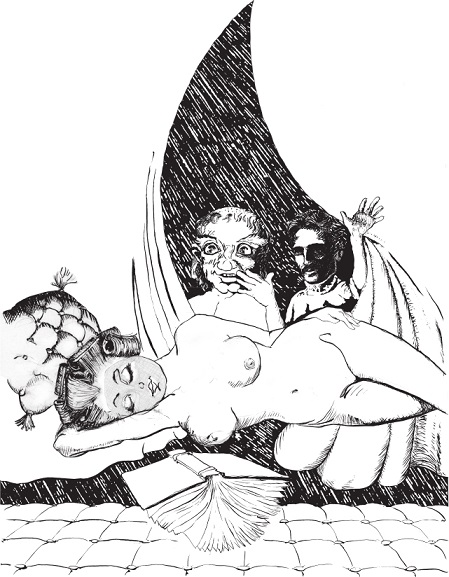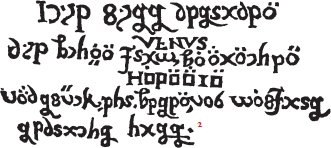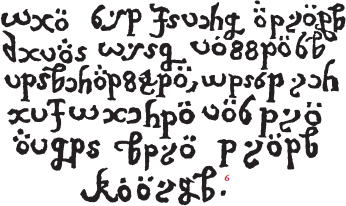
THE FIFTH DAY
The night was passed, and the dear longed-for day had just broken, when I leapt out of bed, more eager to find out what was going to happen next than I was to go on sleeping. I put on my clothes, and as before I slipped down the stairs, but it was still too early and the hall was empty. I returned then, and asked my page if he would please take me around the castle for a bit and show me something special. He was agreeable (as he always was), and he led me down a certain staircase that led down under the earth. We came to a great iron door, and set into the door were tall letters, made of copper.1 They said:
I copied this inscription down in my notebook. We opened the door, and my page led me through a dark passage till we came to another door, this one very small, which was not fully closed. “This door was opened yesterday,”3 my page said, “when the six coffins were taken out, and hasn’t yet been shut.”
As soon as we went in, I beheld the most amazing thing Nature has ever produced, for the vault was lit by nothing but a number of immense jewels – this was, my page said, the king’s treasury! A tomb stood in the middle of the place, so fabulously rich I was amazed it was left unguarded.
“You should thank your lucky stars,” my page said. “You are getting to see things that no other human has ever laid eyes on, except the royal family themselves.”
This tomb was triangular. In the middle of it stood a large polished copper basin. The rest was pure gold and gems. In the copper basin stood an angel who held in her arms the branches of an unearthly tree which dropped fruit continuously into the basin. As soon as a fruit touched the water it became water itself and flowed away into three smaller vessels nearby. The whole thing was supported by three animals: an eagle, an ox, and a lion, standing on a splendid base.4
“What does all this mean?” I asked.
“It means,” he said (as had the door we passed through),“that here Lady Venus lies, the beauty who’s undone so many and robbed them of wealth, honor, blessing, and happiness.” Then he pointed to a copper door, let into the paving-stones of the vault. “If you want, we can go down farther.”
“I’ll follow you,” I said.
He lifted the door, and I went down the steps after him. It was pitch dark, but in a moment he opened a little box that held an ever-burning candle, and at it he lit one of the torches that lay there. I was growing extremely nervous, and I asked him very seriously if we should be doing this.
“As long as all the royal persons are still asleep, we don’t need to be afraid.”
In the room we reached was a rich bed, hung about with exquisitely embroidered curtains. We drew the curtains aside, and I saw Lady Venus. My page pulled off her coverlets, and there she was, stark naked,5 lying in such beauty, such an astonishment, that I was almost beside myself. I couldn’t tell if perhaps she was actually a piece of carven stone, or a human dead body, she was so entirely still and unmoving – I didn’t dare touch her to find out. At last he covered her again and drew the curtain; yet she had been imprinted, so to speak, on my eyes, and I saw her still.
Beside the bed was a tablet, with these words written on it:
I asked my page what this meant, but he just laughed and promised that I’d find out myself soon enough. He put out the torch, and we climbed out again. Now I could have a better look around in the vault, and discovered a number of small alcoves, and in each a little pyrite taper was burning – I hadn’t noticed this before, because the flame of the taper was so clear and steady that it resembled a jewel more than a flame. But these pyrite tapers were causing the fruit-tree that the angel held to melt away, even though it continued to produce new fruit.
“Here’s what I heard old Atlas tell the king,” my page said to me. “When the tree is entirely melted away, that’s when Lady Venus down below is going to wake up, become the mother of a king…”7
Perhaps he was going to tell me more, but just then little Cupid flew into the room. At first he seemed alarmed to find the two of us there, but when he saw how pale and stunned we ourselves were, more like the dead than the living, he had to laugh. “What ghost brought you here?” he asked me.
“I got lost in the castle,” I stammered. “Somehow, I don’t know how, I ended up here. This page, my page, went looking for me everywhere, and just now has come upon me here. I hope I haven’t done anything wrong.”
“Well, all right, my busy old grandpa,” Cupid responded. “But you might have played a mean trick on me, if you’d guessed what this door here is for. I’d better just lock it up.” And he put a big lock on the copper door I’d gone down by.
Thank God he hadn’t found me sooner! My page was relieved too that I’d covered for him in a pinch.

…I saw Lady Venus.

“And yet, and yet,” said Cupid, still smiling. “I don’t think I can just let you off, seeing how close you came to stumbling on dear Mother.” With that, he thrust the point of his dart into the flame of one of the bright pyrite tapers, and when it was hot he pricked me with it on the palm of my hand. It didn’t hurt too badly at the time – I was just glad that I’d got away with so little harm done. Or so I thought.8
Meantime everyone else had risen and gone down into the hall, so I snuck up to my room and then came back down again, as though I too had just awakened. Cupid, when he’d locked up those secret chambers below, came in too. He made me show him my hand, where there was still a little drop of blood. “Better be nice to him,” he joked to the others. “He’s not long for this world!” It amazed all of us that Cupid could flit about so cheerfully, without any sense of the dreadful things that happened the day before – he seemed entirely untroubled.
Our president appeared, dressed for a journey in black velvet, but carrying her laurel branch as always. Everything was prepared, she said; we were to drink something and then quickly form up for the procession, so we drank and followed her in order out into the court.
There lay six coffins. All my brothers of course assumed that the six royal persons were inside them. I knew better, but I didn’t know what the point was of these six empty ones.9 By each coffin stood eight hooded men. As soon as music was heard – awesomely tragic and dreary – the men lifted the coffins, and we went after them into that same garden where we had seen the unweighty people punished. A wooden pavilion had been set up there, standing on seven pillars and topped with a crown. Within it were dug six graves, and by each one was a slab of stone, but in the middle was a large hollow stone globe. Silently and gravely the coffins were lowered into the graves and the stones were laid over them and sealed. The little chest containing the head and axe of the black executioner – supposedly – was placed in the round stone in the middle.
My companions were all completely fooled. They could only suppose that the royal corpses were now entombed. A large flag with a phoenix painted on it was raised above the building, perhaps to make monkeys of us all the better, I don’t know10 – I was just grateful to God that I knew more than the others did.
When all these ceremonies were done, our mistress climbed up to stand on top of the stone globe. She spoke briefly, telling us that we should fulfill the commitments we had made, not shrink from the suffering and labor we must undergo but pitch in to bring these royal persons buried here back to life. “Rise up now, and come with me to Olympus Tower, to bring back the necessary life-giving medicines!”
Of course we all cried out that we would, and she led us out through a little door in the courtyard that opened right onto the shore. There were the seven ships, all empty.11 Our president’s troop of girls had planted their own laurel branches on the ships’ decks, and they assigned each of us to one or another of them. When we were all aboard, the ships were commanded in the name of God to set out. From the shore those maidens watched us till they could see us no more, and then with the guards returned into the castle.
Each of our ships had a great banner and was marked with its own sign. Five of the signs were the five Platonic solids, and my ship, on which the lady president also sailed, had the sign of the sphere. Each ship had only two crewmen, and we sailed in a particular order. In front went the small ship in which I guessed the Moor’s head lay, and which also carried twelve fine musicians. Its sign was the Pyramid. Behind that ship three sailed abreast, and mine was the middle one. Behind us came the two tallest and grandest ships, decorated with many of the laurel branches and carrying no passengers; their flags were the Sun and the Moon.12 In the rear was one ship, carrying forty of the royal maidens.
We crossed the wide bay and out through a channel into the sea itself,13 and what did we see but all the sirens, sea-goddesses, nymphs and mermaids waiting for us! They sent one mermaid swimming over to deliver a present from all of them in honor of the wedding. It was a huge pearl, glowing and perfectly round, in a rich setting, a pearl the like of which has never been seen, not in our hemisphere, and not in the New World, either. Our directress received it.
“Would you all,” this mermaid asked, “like to stop your ships here for a while, and let us entertain you?”
“Very gladly,” our president called down to her.
She gave directions that the two tall ships flying the Sun and Moon should stand in the middle of a pentagon formed by the rest of us. The sirens and nymphs formed a ring around us and with the most delicate, sweet, piercing voices began to sing this song:
What can be, on earth or sea,
More lovely than true love?
It makes us good as good can be,
To neighbors each more neighborly.
So let’s all sing, unto the king,
So loud the sky and sea shall ring:
We’ll ask, and all you answer!
What gives sweet life to all?
(It’s love!)
What lifts us when we fall?
(It’s love!)
We’re from our mothers born –
Through love;
Without it live forlorn –
Dear love!
Man lies in bliss with wife –
It’s love!
Babe sucks her breast for life –
That’s love!
What to our parents do we owe?
Love, all love.
What makes them patient with us so?
It’s their good love.
What can overcome the worst?
It’s love!
How do we find such love at first?
Through love!
So let’s all sing, our song resounding –
In our queen and our true king
Love with love by love increasing.
Their bodies earthly, souls of fire,
We’ll labor, suffer, never tire,
By God’s great name, by His love’s flame,
We’ll join them each to each again.
By the time they had finished this song, so heart-shaking in its harmonies and melodies, I understood why Ulysses stopped the ears of his shipmates – I felt like the unluckiest man alive, simply because I was myself and not a creature as lovely and blessed as these. But the young mistress soon sent them away and commanded us to sail on. She sent to the mermaids a long red scarf for a reward, and they all dispersed into the sea.
Well, I was coming to be very aware that Cupid had begun his work inside me, which wasn’t really my doing, I suppose. Since any lengthy description of these giddy feelings I felt isn’t going to do the reader any good, I won’t go into details. I understood, though, that the hurt I’d taken from Cupid was prophesied by the wound to my head I got in the dungeon of my dream on that first day. Let me warn you, then, about hanging around by Venus’s bed: her son Cupid’s not going to let it pass unpunished!
We spent the rest of the time aboard in pleasant talk, and at length came in sight of Olympus Tower. The young mistress ordered some cannons fired to announce our approach, and almost immediately we saw a great white flag raised over the tower, and a little gilded craft set out to meet us. When it came close, we could see a very elderly man aboard, who was the warder of the tower, and guards dressed in white.14 We were hailed in friendship and our ships were conducted to the tower harbor.
The tower stood upon a perfectly square island and was surrounded by a wall so thick that I counted two hundred and sixty steps in passing through it. Past the wall was a pleasant meadow, with here and there small orchards where exotic fruits – unknown at least to me – were ripening; then an inner wall circling the tower itself. The tower resembled seven separate towers bound together, with the middle one a little higher; inside, they let into one another, and each was seven stories high. As soon as we entered in at the gate, we were ushered away down to one side – obviously this was so that the coffins15 could be brought in without our seeing them, though of course no one else knew that.
We were taken down into the very bottom of the tower, which was painted with striking murals but was very sparely furnished – basically it was a laboratory, where we were to crush and wash herbs and precious stones and other sorts of things and extract their essences, and bottle these and store them. Our young mistress bustled among us giving orders and making sure everyone had plenty to do; we were to be mere laborers here until we had done all that was necessary for the restoring of those beheaded bodies. I learned afterwards that as we worked, three of her girls were washing the bodies with care in a nearby chamber.
When we had worked a good long time, we were given a little broth and a small glass of wine, and nothing more, which made it clear we weren’t here for pleasure. At the end of our day of labor everyone had to be satisfied with only a thin mattress, laid on the floor, to sleep on. I myself didn’t care about sleeping; I went out into the garden, and went as far as the outer wall. The night was perfectly clear, and I was happy to spend the time watching the stars. I happened upon a set of stone stairs leading to the top of the wall, and the moonlight was so bright that I dared go up them, and stood looking out at the sea, which was now quite calm.
When I had oriented myself and studied the sky more thoroughly, I realized that on this very night an unusual conjunction of the planets could be observed. I had been thus looking out at sea for a good while, when just at midnight, as the tower clock struck twelve, I saw far-off the seven flames.16 They were coming over the sea, toward the island, headed it seemed for the midmost tower. I grew afraid, for as soon as the flames had gathered at the tower’s top, the wind rose, and the sea grew stormy; clouds covered the moon, and my enjoyment turned to terror. I scarcely had time to find the stairs by which I’d come up, and get down into the tower again. Whether the seven flames remained there at the tower’s top or went away again, I can’t say, because in the dark and the wind I didn’t dare go out again. I lay down on my mattress on the laboratory floor beside a gently murmuring fountain, and with that I fell asleep.
So the fifth day, too, ended with amazing events.

1 In alchemy, copper is the metal of Venus as lead is of Saturn and iron of Mars. Venus is a key but ambiguous figure in the alchemical process – she can symbolize both the unclean and chaotic matter with which the alchemist begins his work – she is referred to as the Whore – but she can also be the cold, chaste, moist substance related to the Moon and to silver.
2 The letters are a simple substitution code, with odd symbols standing for letters in German. It’s mere mystification, since the page translates a moment later.
3 The events are occurring in linkage with one another, truly resembling the cascade of events in an alchemical athenor. Venus is in the cold state preceding the beginning of the Work to revive the dead royals.
4 The eagle, the ox and the lion are Christian symbols of three of the four Gospels. They are also three of the beasts who draw the car of Ezekiel to the throne of God. The fourth would be a winged man, who could be the central angel described here, except that this figure is explicitly female. The mystery isn’t lessened by the Page’s bland answer to Christian’s question – it’s just the translation of the coded copper letters.
5 Montgomery notes the resemblance of the whole scene to the Tarot card called The World (XXI), showing a naked woman surrounded by the four animals of Ezekiel/the Gospels. What if anything the correspondence might signify can’t be known, as we have no knowledge that Andreae had any interest in or knowledge of Tarot; Tarot trumps weren’t commonly used as occult symbols until a later century.
6 “When the fruit of my tree/Shall be entirely/Molten I will/Awake and be/A mother of a/King.” Again, the page will respond in a moment by translating the coded letters.
7 The page attributes the mystic words to old Atlas.
8 This moment with Cupid is the crux of one theme of the story, a theme or series of events that stands in a counterpoint with the triumphant story of the re-creation of the royal couple. Both are centrally about sex, but one is the inverse of the other.
9 Starting here, certain of the brothers are going to be variously fooled and misdirected, so that only a small number end up participating in the culmination of the work.
10 The Phoenix is periodically consumed in fire and then resurrects itself from its own ashes. A very common symbol throughout alchemical lore (and Christian iconography) of life arising from death. The brothers are able to read the symbol, which will add to their certainty that the bodies to be resurrected are buried below.
11 This too suggests that the bodies have already been transported to the island; but in the next paragraph Christian guesses that the Moor’s head is still in the lead ship. So they aren’t all empty.
12 These two ships ought to be carrying the coffins containing the king and queen; if they were transported the night before (see above), the imposture about the coffins is continuing.
13 In alchemy, the undifferentiated prima materia the Work begins with. One alchemical text says the dead king must be marinated in the sea before being brought to dry land.
14 The white clothes and the white flag can be understood as suggesting the albedo stage of the work, when the blackened corpse of matter has been washed in mercurial waters and turned white. Seas and white flags and seven-story towers and the phoenix are common in allegorical tales of things that happen in alchemical experiments – but it seems to me that CW can’t be an allegory of the alchemical work and a straightforward recounting of it at the same time.
15 This sentence compounds the mystery of when the coffins arrive – it seems to say distinctly that the brothers are taken to one side so that the coffins can be secretly unloaded, though this ought to have happened the night before if they were all brought over then. Montgomery says simply “This took place the previous night,” without explaining how.
16 Now they are seven again, and they are coming to the tower from across the water, apparently from the castle (where else?) Where have they been, doing what?

